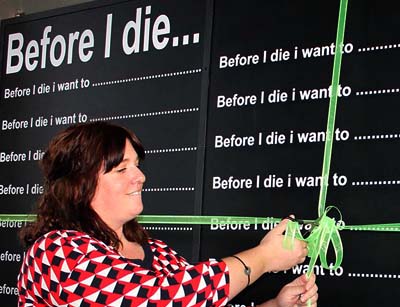 |
Cornelia Faasen, Director: Student Life at the wall.
11 September 2013
Photo: Leonie Bolleurs |
The Bloemfontein Campus offers a new creative manner of expression through the Before I die Wall. Similar walls are found in over 30 countries across the globe, including Argentina, China, Italy, New Zealand and Denmark. Kovsies is the only university in South Africa with this fixture, one of merely three in the country.
The wall provides the opportunity to students to write down the things they would like to do before they die.Elsa Mostert, head of the Student Life and Leadership (SLL) volunteer’s office, says the presence of such a wall on campus contributes to the holistic, personal and professional development of students. “The wall addresses post-tertiary development needs. It serves the university by enabling students to rethink the priorities in their lives and to help them focus on their dreams.”
This wall is located at the student centre, Thakaneng Bridge, outside the bookshop.“Everyone is welcome to write on the wall. It will be wiped clean after every two weeks,” Mostert says.